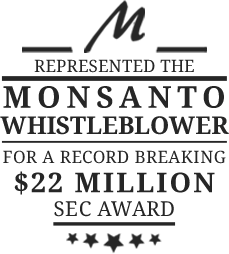








Is It Good to Be a Whistleblower?
Many people who discover fraud are hesitant to come forward for a number of different reasons. Maybe they have a close relationship to the fraudster, are employed by a company committing fraud, or are unsure of what they’ve uncovered and don’t want to “jump the gun.”
Many whistleblowers wonder whether they are doing the right thing by coming forward. If you have experienced similar thoughts, you are not alone. But the importance of whistleblowers is monumental, and without them, more people would suffer.
Continue reading to learn more about why becoming a whistleblower is good and how you can protect yourself as you move through the whistleblowing process.
Benefits of Blowing the Whistle
Finding out that someone you may know has been engaging in securities fraud, you may be unsure of how to proceed with the information you have. Do you report it? Do you “mind your own business”? Whom do you call for help?
Reporting fraud and misconduct is the right thing to do, despite the fact that there are risks associated with whistleblowing. The individuals who are victims of fraud deserve justice, and the fraudsters should be held accountable for their actions.
The U.S. Securities and Exchange Commission (SEC) is responsible for handling stockbroker fraud and cases of misconduct within the securities industry. The SEC Office of the Whistleblower is where you would report your tip if you made the decision to become a whistleblower.
Not only are you doing what is morally and ethically right by reporting your tip to the SEC, but because of your efforts in coming forward, the SEC may be able to award you. Eligible whistleblowers could be entitled to a whistleblower award of up to 30 percent of the sanction recovered by the SEC.
Risks of Becoming a Whistleblower
When you decide to become a whistleblower, you’re taking a significant personal, professional, and financial risk. In many cases, whistleblowers are working with a company, supervisor, or colleague that may be engaging in fraud.
This means their employment status and professional reputation is on the line if they choose to become whistleblowers. Although retaliation is illegal and punishable through both the SEC and civil court, it is still quite common for whistleblowers to face retaliation.
Thankfully, when you work with an SEC whistleblower lawyer to report your tip, you can do so anonymously. The SEC requires you to have legal representation if you want to protect your identity, so it can communicate with you when necessary. Your identity will become known to the SEC only if you are entitled to a whistleblower award.
Contact an SEC Whistleblower Lawyer
When you are ready to step up and bring your information to the SEC, call a respected SEC whistleblower lawyer at Meissner Associates. Schedule your confidential tip review by phone at 1-866-764-3100 or through the quick contact form included at the bottom of this page.
